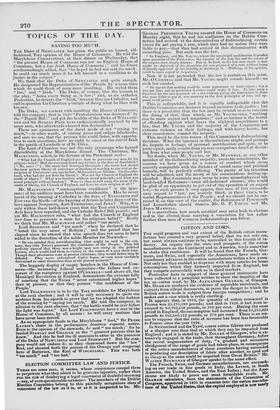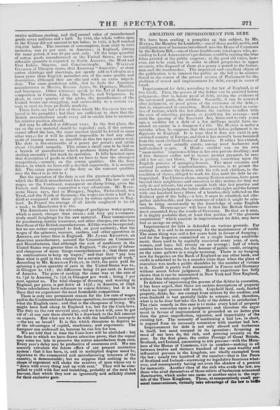COTTON AND CORN.
THE rapid progress and vast extent of the British cotton manu- facture has created a very general belief, that we not only are,
but must always continue to be, unrivalled in this branch of in- dustry. An inquiry into the state and prospects of the cotton manufacturers on the Continent and in America, tends somewhat to shake this confidence. It will be found that the French, Ger- mans, and Swiss, and especially the Americans, have made ex- traordinary advances in the cotton manufacture within a few years. Not only are they enabled to dispense with many articles for home consumption which they formerly imported from England, but they compete successfully with us in third markets. Particular facts in support of these general statements have been collected in a pamphlet written to show the impolicy of the
tax on cotton wool, by Mr. ALEXANDER GRAHAM, of Glasgow. Mr. GRAHAM produces the evidence of reputable merchants, and extracts from official documents, to prove the danger to which the British cotton trade is subject from foreign competition; and he makes out a ease which is really startling. It appears that, in 1812, the quantity of cotton consurned'in France was 25,191,189 pounds; and that in 1826, it bad been in- creased to 83,993,210 pounds, or 310 per cent. During the same period in England, the consumption had increased from 61,215,024 pounds to 162,889,112 pounds, or 270 per cent. There is no rea- son to suppose that the ratio of increase has been less favourable to France since the year 1826.
In Switzerland and the Tyrol, coarse cotton fabrics are produced at a cheaper rate than that at which they can be imported from
England ; and it is stated by Mr. ZOLLER of Glasgow, who is ex- tensively engaged in the trade, that throughout Germany, before the recent augmentation of duty, "a gradual and successive abridgment of the range of goods had taken place, in consequence of the native manufacturers of these countries having succeeded in producing one description of fabric after another, as good and as cheap as the same could be imported from Great Britain." Mr. WALTER BUCHANAN of Glasgow speaks to the same effect. The French, Swiss, and German manufacturers, are encroach- ing on our trade in fine goods in Italy, the Levant, in South America, the United States, and the East Indies ; but the Am& ricans are likely to prove our most formidable rivals. Mr. GRAHAM calculates, from the statements of the Committee of Congress, appointed in 1831 to examine into the cotton manufac- ture of the United States, that the capital employed is now nearly
twelve millions sterling, and the annual value of manufactured goods seven millions and a half. In 1808, the whole cotton spun in the Union did not amount to ten bales; in 1835, it hiN1 reached 216,888 bales. The increase of consumption, from 1828 to 1833 inclusive, was 65 per cent. in America ; in England, during the same period, it was 40 per cent. only. Of the large quantity of cotton goods manufactured in the United States, no incon- siderable quantity is exported to South America, the West and East Indies, Smyrna, and Constantinople. Mr. WILLIAM
GRAHAM of Glasgow states, that American " domestics," or stout cotton shillings and sheetings, are openly sold in Calcutta at a
lower price than English manufactires of the same quality and description, although they are chaNed with an extra import- duty. The same gentleman adds, that be finds the American manufactures in Mexico, Buenos Ayres, St. Domingo, Manilla, and Sineapore. Other witnesses speak to the fact of American competition in Canton, Lima, the Brazils, and Valparaiso. In short, in every quarter of the globe, the manufactures of the United States are struggling, and successfully to a certain ex- tent, to oust us from praitable markets.
These facts are but a few of those which Mr. GRAHAM has col- lected in his pamphlet ; but they are sufficient to show that the British manufacturer needs every aid to enable him to maintain his relative position abroad.
Aid may be afforded in different ways. In the first place, the tax on the raw material should be repealed; and, if the revenue cannot afford the loss, the same amount should be levied in some other way,—for it will be almost impossible to find any other mode of raising money so impolitic as this tax upon cotton wool. The duty is five-sixteenths of a penny per pound ; and yields about 345,000t. annually. This seems a small sum to be laid on a branch of manufacture which produces thirty-four millions sterling annually ; but mark its operation. It falls heaviest upon that description of goods in which we have to bear the strongest competition,—namely, on the coarse qualities. On the finer fabrics, in which we have still a decided superiority, it is scarcely felt. The extra pressure of the duty on the coarsest qualities over the finest is as 200 to 1.
But the operation of the duty is not the greatest obstacle with which the British manufacturer has to contend. The low rate of wages on the Continent, consequent on cheap living, gives the French and German competitor a vast advantage. Mr. RATH- BONE GREG says, that in Hungary, Naples, Switzerland, the Tyrol, and the North of Germany, the wages are from a half to a third as compared with those given by cotton-spinners in Eng- land. In Franca the average of all hands employed is 58. 8d. a week ; in Manchester it is 10s.
The Americans have the advantage of prodigious water-power, which is much cheaper than steam ; and they pay a compara- tively small freightage for the raw material. Their commissions for purchasing, marine insurance, and other charges, are also less than those of the British manufacturers. All this was to be expected; but we are rather surprised to find, on good authority, that the wages of the spinners, weavers, carders, and other operatives in America, are lower than in England. Mr, JAMES KEMPTON, an American manufacturer, assured the Committee on Commerce and Manufactures, that although the cost of machinery in the United States was greater than in England, "Ike price of labour and cheapness of many things counterbalance it ; that there are no combinations to keep up wages;" and that they "pay less than what is paid in this country for a certain quantity of work." According to Mr. KIRKMAN FINLAY, in 1833, the price paid for spinning a given quantity of yarn in the United States was 4s., in Glasgow 4s. 11d.; the difference being 22 per cent. in favour of America. The price of carding the same was at the rate of 6s. 74d. in America, 7s. lid. in Glasgow per week ; being 7 per cent, against us. The total charge of dressing and weaving in England, per piece, is put down at 144d.; in America, at 100. These calculations have reference to coarse fabrics; but it is in those that we experience the most formidable competition. There is only one permanent reason for the low rate of wages paid to the Continental and American operatives, in comparison with 'what the English earn ; and that is the cheapness of living. We might have food cheap in England too, but for the Corn-laws. The duty on the raw material may, and we trust will, soon be got rid of: at any rate there should be a drawback to the full amount on exports. But what are we to do with the landlord's monopoly —the tax on bread? It is this which threatens to deprive us of the advantages of capital, machinery, and experience. The foreigner can undersell us, because he can live for less.
We are told that in time the Corn-laws will be abolished : but the facts to which we have drawn attention prove, that the repeal may come too late to preserve the cotton manufacture from ruin. Every year's delay may be productive of enormous evil. We can scarcely calculate the future effect of our present restrictive system : that it has been, is, and in multiplied degree must be, injurious to the commercial and manufacturing interests of the country, is demonstrable; but we suppose that nothing in the shape of argument will shake the resolves of men whose cry is "down with every thing and up with rent." They will be com- pelled to yield with fear and trembling, probably at the next bad harvest, that which they now so ignorantly and selfishly clutch for their exclusive gain.



























 Previous page
Previous page